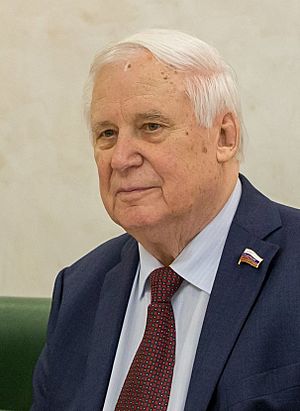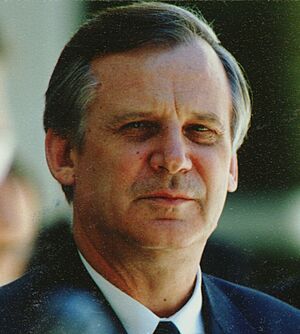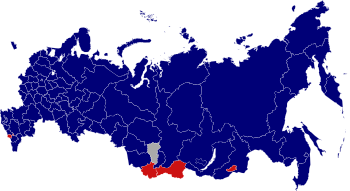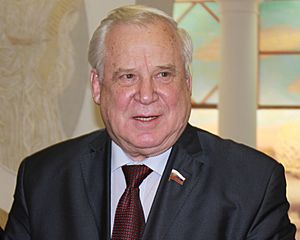Nikolai Ryzhkov facts for kids
Quick facts for kids
Nikolai Ryzhkov
|
|
|---|---|
|
Николай Рыжков
|
|

Ryzhkov in 2019
|
|
| Russian Federation Senator from Belgorod Oblast |
|
| In office 17 September 2003 – 25 September 2023 |
|
| Member of the State Duma | |
| In office 17 December 1995 – 17 September 2003 |
|
| Chairman of the Executive Committee of the People's Patriotic Union of Russia | |
| In office 7 August 1996 – 1998 |
|
| Preceded by | None—post established |
| Succeeded by | Viktor Zorkaltsev |
| 10th Premier of the Soviet Union | |
| In office 27 September 1985 – 14 January 1991 |
|
| President | Andrei Gromyko Mikhail Gorbachev |
| Deputy |
Ivan Arkhipov
Heydar Aliyev Nikolai Talyzin Vsevolod Murakhovsky Yuri Maslyukov Lev Voronin Vladilen Nikitin |
| Preceded by | Nikolai Tikhonov |
| Succeeded by | Valentin Pavlov (as Prime Minister) |
| Head of the Economic Department of the Central Committee of the Communist Party of the Soviet Union | |
| In office 1982 – August 1985 |
|
| Preceded by | Boris Gostev |
| Succeeded by | Boris Gostev |
| Full member of the 26th, 27th Politburo | |
| In office 23 April 1985 – 13 July 1990 |
|
| Member of the 25th Secretariat | |
| In office 22 November 1982 – 15 October 1985 |
|
| Full member of the 26th, 27th, 28th of the Central Committee | |
| In office 3 March 1981 – 29 August 1991 |
|
| Personal details | |
| Born |
Nikolai Ivanovich Ryzhkov
28 September 1929 Shcherbynivka, Ukrainian SSR, Soviet Union (now Toretsk, Ukraine) |
| Died | 28 February 2024 (aged 94) Moscow, Russia |
| Citizenship | Soviet/Russian |
| Political party | Independent (present) |
| Other political affiliations |
People's Patriotic Union of Russia (1996–2003) Communist Party of the Soviet Union (1956–1991) |
| Spouse | Ludmila Ryzhkova |
| Children | Marina |
Nikolai Ivanovich Ryzhkov (Russian: Николай Иванович Рыжков; Ukrainian: Микола Іванович Рижков; 28 September 1929 – 28 February 2024) was an important politician from the Soviet Union and later Russia. He was the last person to serve as the Chairman of the Council of Ministers, which was like being the Prime Minister of the Soviet Union. This job was changed in 1991.
During the time of Mikhail Gorbachev, Ryzhkov was in charge of managing the culture and economy of the Soviet Union. After his time as premier, Valentin Pavlov took over in 1991. Ryzhkov also ran against Boris Yeltsin in the 1991 Russian presidential election. He was the last surviving former Premier of the Soviet Union.
Ryzhkov was born in 1929 in a city called Shcherbynivka in the Ukrainian SSR. After finishing his studies in the 1950s, he started working in local factories. He slowly moved up in the Soviet government, especially in industrial roles. In 1979, he became the First Deputy Chairman of the State Planning Committee. When Nikolai Tikhonov stepped down, Ryzhkov became the new Chairman of the Council of Ministers. While in this role, he supported Gorbachev's plans to change the Soviet economy in the 1980s.
In December 1995, Ryzhkov was elected to the State Duma in Russia as an independent politician. He then led a group called "Power to the People." Later, he became a formal leader of the People's Patriotic Union of Russia alongside Gennady Zyuganov. On September 17, 2003, he left his seat in the Duma and became a member of the Federation Council. He stayed there until he retired in 2023. Because of the 2014 Crimean crisis, some countries like Canada, Switzerland, and the United States placed sanctions on him in March 2014.
Contents
Early Life and Start in Politics
Nikolai Ryzhkov was born on September 28, 1929, in Dzerzhynsk, which was in the Ukrainian Soviet Socialist Republic. His parents were Russian. He finished his studies at the Ural Polytechnic Institute in 1959.
Ryzhkov was a skilled engineer and manager. He began his career as a welder. He worked his way up at the Sverdlovsk Uralmash Plant. From 1970 to 1975, he became the Factory Director of the Uralmash Production Amalgamation. He joined the Communist Party of the Soviet Union (CPSU) in 1956.
In 1975, Ryzhkov moved to Moscow. He was appointed First Deputy Minister of the Ministry of Heavy and Transport Machine Building. In 1979, he became the First Deputy Chairman of the State Planning Committee. He was also elected to the CPSU Central Committee in 1981.
Yuri Andropov, a Soviet leader, made Ryzhkov the head of the Economic Department of the Central Committee. In this role, Ryzhkov was in charge of important planning and financial groups. He reported directly to Mikhail Gorbachev. Ryzhkov believed that if Andropov had lived longer, the Soviet Union might have had economic changes similar to those in China. During Konstantin Chernenko's short time as leader, Ryzhkov and Gorbachev worked on several reform plans.
When Gorbachev became the main leader, Nikolai Tikhonov was the Chairman of the Council of Ministers. Tikhonov was made chairman of a new committee, but Ryzhkov was the real leader of that committee. On April 23, 1985, Ryzhkov became a full member of the Politburo. On September 27, 1985, he took over from Tikhonov as the Chairman of the Council of Ministers.
Time as Premier
Important Events During His Leadership
After the Chernobyl disaster, Ryzhkov visited the damaged nuclear plant on May 2–3, 1986. He ordered everyone within 30 kilometers of the plant to be moved to safety. This distance was an estimate, and later it was found that some areas with radiation were not evacuated.
In 1988, a big earthquake hit the Armenian Soviet Socialist Republic. Ryzhkov promised to rebuild the city of Spitak within two years. He led a special group to help the local government. He stayed in Armenia to help coordinate the rescue efforts. He even appeared on television, which made him more popular. However, he could not keep his promise to rebuild Spitak. This was partly because of the Soviet Union's growing economic problems. Also, many buildings in the city were not built to withstand earthquakes, making them hard to rebuild.
Changes to the Economy
Ryzhkov supported Gorbachev's early idea to make more and better goods during the Twelfth Five-Year Plan (1986–1990). The government put a lot of money into factories that made machines. However, Gorbachev later wanted to invest in almost all industries, which Ryzhkov knew was too expensive for the government. Ryzhkov also wanted to make more consumer goods, but this was also difficult.
Ryzhkov did not agree with Gorbachev's campaign against alcohol. He believed it would cause the government to lose billions of roubles in income. He thought Gorbachev was focusing too much on ideas rather than practical solutions.
Ryzhkov and Gorbachev continued to work on economic changes. In 1987, they started creating the Law on the State Enterprise. This law aimed to give factories more control and reduce the power of central planners. This law later gave workers too much power. Nikolai Talyzin, who led the State Planning Committee, was blamed for this problem. Ryzhkov replaced him with Yuri Maslyukov.
Ryzhkov supported moving away from a fully planned economy. However, he understood that allowing private businesses would make the government less powerful. Many government officials also wanted to keep the old system. Gorbachev often blamed Ryzhkov and his government for the economic problems during this time, which caused tension.
By 1986, Ryzhkov said that Soviet leaders were already talking about creating a market economy. He wanted a "regulated market economy." In this system, the government would still control the most important parts of the economy. He also supported creating companies that were partly private and partly government-owned. Ryzhkov and many others, including some from the KGB and the military, did not support the 500 Days Programme. This plan wanted a very fast change to a market economy. Ryzhkov suggested waiting until 1992 for this change. He also thought the government should take back some control between 1990 and 1992 to make things stable.
In 1989, a new group was formed to work on economic reforms. It was led by Leonid Abalkin, who also became a Deputy Chairman of the Council of Ministers. With Ryzhkov's support, Gorbachev closed the Central Committee's economic department. This gave the government more power over economic matters. In 1990, Gorbachev created the job of President of the Soviet Union. This made the government less powerful, and Ryzhkov and his team did not like this change.
Changes in Prices
Ryzhkov and Gorbachev had slightly different ideas about changing prices. Ryzhkov wanted the government to control price increases. Gorbachev, who supported market changes, was against this. Ryzhkov suggested price reforms to Gorbachev many times, but Gorbachev always said no. Gorbachev then blamed Ryzhkov and other leaders for delaying these necessary price changes.
Ryzhkov had the support of important groups like the Ministry of Finance and the State Committee on Prices. These groups were led by Valentin Pavlov, who later became Soviet Premier. Unlike Gorbachev, Ryzhkov actually had a plan for how to move to a market economy.
By 1988, Ryzhkov often agreed with Leonid Abalkin, an economist who believed in being careful with government money. Gorbachev criticized Abalkin, but Ryzhkov continued to support him. Ryzhkov then had to create a more careful reform plan for 1989. This plan delayed price changes until 1991. In April 1990, Ryzhkov's price reform plan began. However, it was quickly stopped after strong criticism from Boris Yeltsin and others. The economic problems in 1990 were blamed on Ryzhkov, even though Gorbachev had delayed his plans.
In his memories, Gorbachev said that one big price increase would be better than many small ones. At the 28th Party Congress, Gorbachev said it would be "silly" to start economic reforms with price increases.
Leaving His Position
In August 1990, some leaders tried to convince Gorbachev to make Ryzhkov resign. Gorbachev did not want to do this because he feared it would cause more problems with other leaders. Ryzhkov had many supporters who liked him because he disagreed with some of Gorbachev's changes. In July 1990, Ryzhkov lost his seat on the Politburo when it was reorganized. However, he was still elected as a member of the Presidential Council.
On October 19, 1990, the Russian Supreme Soviet voted to force Ryzhkov and his government to resign. They wanted to start the 500 Days Programme. But the Supreme Soviet of the Soviet Union actually supported Ryzhkov's economic plan more. Ryzhkov's plan passed with a large majority.
The Russian government, led by Ivan Silayev, stopped following Ryzhkov's orders. This made things worse. Many members of Ryzhkov's government urged him to resign so that the Soviet government could work better with the Russian government.
Ryzhkov's plan and the 500 Days Programme were quite similar. Both supported allowing prices to be set by the market, giving more power to local areas, and allowing private businesses. The main difference was that Ryzhkov wanted to keep many social services, like free education, and a strong central government. The 500 Days Programme did not talk about keeping the Soviet Union together. Instead, it weakened the central government by creating a market economy.
In December 1990, Ryzhkov had a heart attack. While he was recovering, the Supreme Soviet of the Soviet Union changed the government. They replaced the Council of Ministers with the Cabinet of Ministers. This new group was led by Valentin Pavlov, who used to be Ryzhkov's Minister of Finance. The new government structure made it less powerful and more under the control of the President.
Running for President in 1991
After recovering from his heart attack, Ryzhkov ran as the Communist candidate in the first election for the President of the Russian Soviet Federative Socialist Republic (RSFSR) in early 1991. His running mate, who would be Vice President, was Boris Gromov. Gromov was a Soviet war hero who led the Soviet military during the end of the war in Afghanistan.
Ryzhkov came in second place in the election. He received over 13 million votes, which was about 16.9% of all votes. He was more than forty points behind Boris Yeltsin, who won the election.
After the Soviet Union
During the 1995 election for the Russian parliament, Ryzhkov said that Russians were worse off under capitalism than they were under Soviet communism. He was elected to the State Duma as an independent candidate. Once elected, he led a group called "Power to the People!" This group was a mix of communists and nationalists. They wanted to bring back the Soviet Union, have a planned economy, and increase government control in the economy. They also promoted nationalism and patriotism.
In 1996, Ryzhkov helped create the People's Patriotic Union of Russia (NPSR). This was an alliance of left-wing groups and nationalists led by the Communist Party of the Russian Federation (CPRF). Ryzhkov was elected chairman of its group in the Duma. During the 1996 Russian presidential election, Ryzhkov supported Gennady Zyuganov, the CPRF candidate.
In September 2003, Ryzhkov became a member of the Federation Council of Russia, representing Belgorod Oblast. He then resigned his seat in the State Duma. In the Federation Council, he was the Chairman of the Commission on Natural Monopolies. He was also a member of the Committee on Local Self-Governance. He retired from the Federation Council in September 2023.
In 2014, Ryzhkov supported Russia sending troops into Ukraine. In 2022, he also supported Russia taking over certain territories in Ukraine after the 2022 Russian invasion of Ukraine.
Death
Nikolai Ryzhkov passed away on February 28, 2024. He was 94 years old.
Sanctions Against Him
In March 2014, after the vote in Crimea, the U.S. Treasury put Ryzhkov on a special list called the Specially Designated Nationals List (SDN). This list includes people who are part of the Russian leadership. Being on this list meant that any money or property he had in the US was frozen. He was also not allowed to enter the United States.
On March 17, 2014, Ryzhkov was also added to the European Union's sanctions list. This was because of his role in Russia taking over Crimea. He was not allowed to enter EU countries, and his money in the EU was frozen.
Awards and Honors
Ryzhkov received many awards and honors throughout his life. Some of them include:
- The Order of the Red Banner of Labour (twice, in 1966 and 1985)
- The Order of the October Revolution (1971)
- The Order of Lenin (1976 and 1979)
- The Order of Merit for the Fatherland, 4th class (2004)
- The National Hero of Armenia (2008) – This was given to him by the Armenian Government for his help after the 1988 Spitak earthquake. They even built a monument to him.
- The Order of Prince Yaroslav the Wise, 5th class (2004) – This was given by the Ukrainian Government.
- The Diploma of the President (2009)
Other awards include:
- Hero of Labour of the Russian Federation (2019)
- Order of the Patriotic War, 1st class (1985)
- Medal "In Commemoration of the 850th Anniversary of Moscow" (1997)
- Medal "In Commemoration of the 1000th Anniversary of Kazan" (2005)
- Jubilee Medal "In Commemoration of the 100th Anniversary since the Birth of Vladimir Il'ich Lenin" (1970)
- Order "Danaker" (Kyrgyzstan)
- Order of Holy Prince Daniel of Moscow, 2nd class
- State Prize of the USSR (twice, in 1969 and 1979)
His Passing
Valentina Matvienko, the President of the Russian Federation Council, announced that Nikolai Ryzhkov died on February 28, 2024, at the age of 94.
Images for kids
See also
 In Spanish: Nikolái Rizhkov para niños
In Spanish: Nikolái Rizhkov para niños





